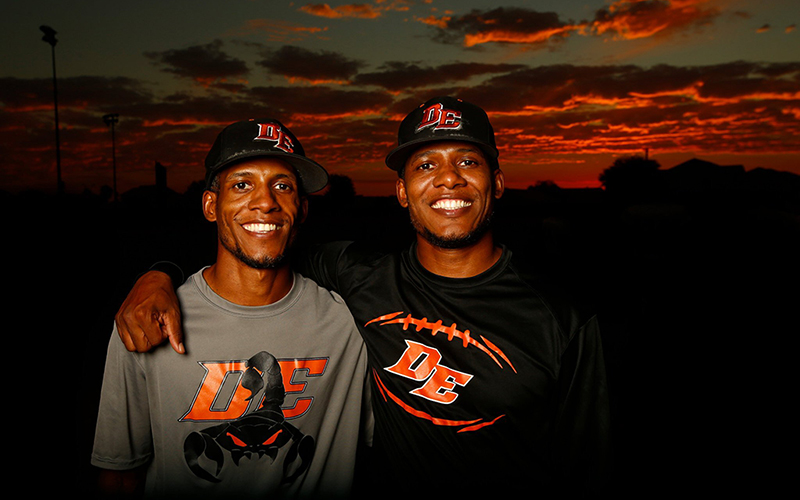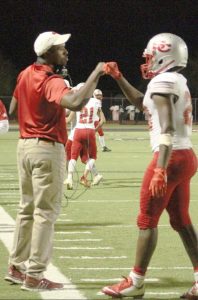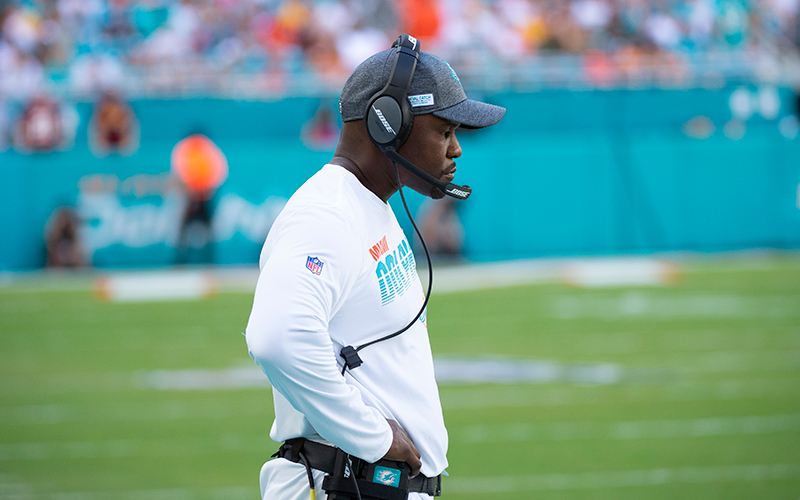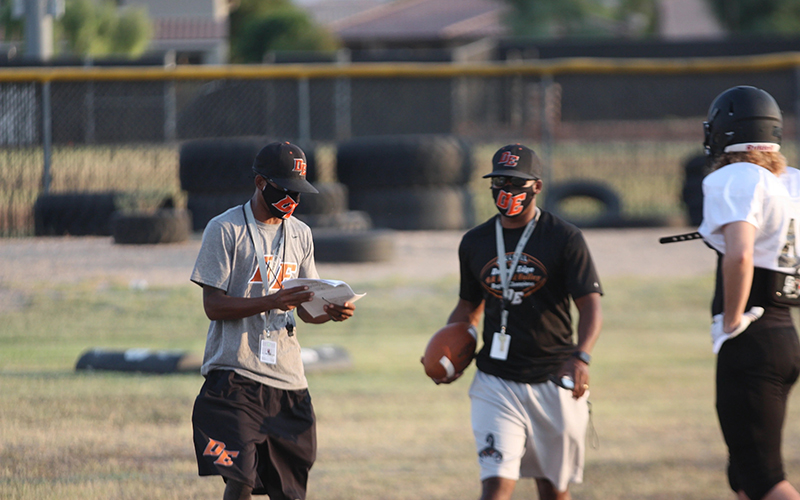
Mark Carter, left, and his twin, Marcus, want to succeed at Goodyear Desert Edge High School but also be role models for other minority coaches (Photo courtesy of Mark Carter)
PHOENIX – The NFL came under renewed scrutiny in January when the Miami Dolphins fired Brian Flores after just three seasons. The dismissal of Flores, who is Black and Hispanic, marked another short tenure for a minority head coach in the nation’s most popular sport.
Flores has filed a class-action lawsuit against the league, alleging systemic racism in the NFL. It includes allegations of discrimination from two other former Black head coaches, including Steve Wilks, who was fired after one season with the Arizona Cardinals.
Just three out of 32 NFL head coaches are Black (9.4%), while 58% of players are, according to a 2021 study by the Institute for Diversity and Ethics in Sport at the University of Central Florida. Nearly 71% are players of color.
What the pro numbers don’t tell is that the lack of representation permeates all levels of the game.
Many Black Arizona high school football coaches say the state has a similar issue: The number of minority coaches does not reflect the diversity of Arizona’s population and of the players.

Rishard Davis is thought to be the only Black coach to win an Arizona Interscholastic Association state football title when Eloy Santa Cruz won the 2A crown in 2019. (Photo courtesy of Rishard Davis)
“We don’t just want to put our foot in the door, but also to have a seat at the table,” said Mark Carter, the co-head coach at Goodyear Desert Edge High School, who is Black. “By having a seat at the table, we can provide opportunities for other coaches by hiring them and putting their foot in the door and shining light on them.”
Although the exact number of high school football coaches in Arizona who are Black isn’t known, only one has won an Arizona Interscholastic Association state football title since the state’s governing body for high school sports began bracketed playoffs in 1959: Rishard Davis in 2019 for Eloy Santa Cruz, a 2A team.
Nine percent of high school football coaches nationally are Black, and 68% are white, according to data collected by Zippia.
A coach’s role extends beyond teaching Xs and Os. They are mentors, leaders and sometimes substitute parents for their players.
George Hawthorne, former head coach at Mesa’s Skyline High School, feels good about the changes he made and the growth he saw when he was there.
“I was fortunate enough to be at Skyline and watch players accomplish things they never thought they could accomplish,” said Hawthorne, the first Black head coach in the Mesa Public Schools district in more than 100 years. “It’s a great responsibility to mold the lives of young men and be a positive influence on them and my coaches. … We saw the overall grades of the students go up significantly. We also watched some troubled kids become better men.”
In his three seasons at Skyline, Hawthorne was 5-23 before the school’s administration let him go.
Hawthorne felt an increasing amount of support from his players and parents as his time at Skyline went on, he said, so he felt hurt but wasn’t surprised when he was dismissed.
“I was the only on-campus coach, while other teams we went up against had 10 or more on-campus coaches,” Hawthorne said. “Because of that lack of support, I wasn’t too surprised when I was let go.”
Going up against opposing staffs that spent every day together put him at a disadvantage, Hawthorne said. Other coaches could interact with players on a daily basis off the field, something Hawthorne’s staff never had the opportunity to do.
After an accomplished career as an assistant coach at Chandler High School, which won multiple state titles, Hawthorne wanted to prove that his success could follow him to a head coaching job. He hoped that his success could lead toward more minority football coaches getting head coaching jobs in Arizona.
“It was a great honor and I wish that I could have done a better job,” Hawthorne said. “There are a lot of other Black and minority coaches who are extremely knowledgeable and great leaders who are deserving of opportunities.”
The pressure minority coaches feel to succeed is significant.
Mark Carter and his co-head coach at Desert Edge – his twin, Marcus Carter – know that pressure.
“Marcus and I shoulder the burden of getting other minority coaches hired,” Mark Carter said. “I take a lot of pride in that.”
The Carters are quick to acknowledge Rishard Davis and his historic accomplishment at Eloy Santa Cruz. Just a few years after winning the 2A title, Davis returned to Alabama to coach near his hometown of Maplesville, removing yet another minority coach from Arizona.
“Being back home in Alabama has been great serving the community I was raised in,” Davis said. “I sure do miss Arizona and consider it home as well.”
For the Carter brothers, the goal remains the same: win a state title and foster the next generation of Black coaches.
“I want to win that trophy so that the spotlight can be on our program and our guys and the culture that we’ve instilled and what we do,” Mark Carter said. “I want everybody in my program who wants to be a head coach to get in that spot. The best way to do that is by winning a state championship and getting that spotlight on us.”

Former Miami Dolphins coach Brian Flores brought attention to the NFL and its lack of diverse hires, but the problem appears to exist at the high school football level as well. (Photo by Doug Murray/Icon Sportswire via Getty Images)
The problem often starts at the top, many Black coaches say, with the decision makers who do the hiring.
“Break the cycle of nepotism and entitlement,” Marcus Carter said.
“The people in charge of hiring are not hiring people that don’t look like them,” Mark Carter said, “and are more likely to take a chance on someone that does not look like them if they don’t already have an established relationship.”
The lack of diversity in leadership may be part of the issue, with 69% of athletic directors in the U.S. identifying as white, according to Zippia research.
The Carters landed their first head coaching job at Phoenix South Mountain High School, which had a Black principal and athletic director at the time. After finding success, they moved to Desert Edge, where they direct one of the top teams in Arizona’s 5A division.
“There was no way that Marcus and I could have walked into Desert Edge and gotten our job,” Mark Carter said. “We had to go to South Mountain first and work with kids who were predominantly minorities at a place where the athletic director and principal were Black. I’m not knocking the A.D., but from our perspective as first-year head coaches, we do not believe that we could have gotten that job.”
Minority coaches often feel the responsibility of acting as role models, too.
“Some of our athletes aren’t exposed to as much diversity,” Mark Carter said. “By putting minority leaders in front of them, they can experience firsthand what it’s like to interact with minorities and squash any narrative about them. Our Black players get to look at people in power who look like them. We also get to show them how to navigate when you have that power. They don’t just look at us as coaches, but also as teachers and leaders.”
The Carters said they don’t follow old-school norms of instilling fear into their players.
“To be honest, our players are like our friends,” Marcus Carter said. “The old-school thinking is to dominate over and have control. Instead, we have conversations with them about life, faith, football and anything else. We joke on each other all the time, they joke on us. They apologize to us, we apologize to them.
“They understand that we are the ones making the decision, but they know that their input matters. Everybody here is valued, and once you add value to people’s life, you’re more likely to get the most out of them.”
Turning to nontraditional tactics sometimes is necessary to get minority coaches a seat at the table, or at least a foot in the door.
These coaches also have an avenue for guidance.
Scottsdale Saguaro defensive coordinator Jim Camarillo founded the Minority Football Coaches Network, where coaches can convene and share strategies and concepts to become better coaches.
“It’s pretty common for people to want to help each other, and that’s what we’re all about,” Camarillo said. “Coaches are helping coaches. We wanted to have a place where coaches can share ideas and become better and smarter coaches.”
Camarillo has noticed that the number of minority coaches around Arizona is growing, and he hopes it will continue to lead to more head coaching positions for minorities.
They all agree it comes down to one thing: opportunity.

